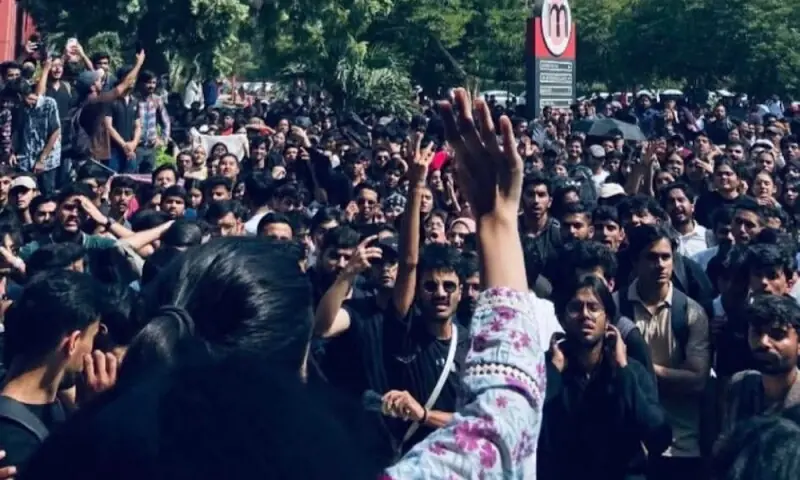On October 23, the red walls of the Institute of Business Management (IoBM), a private university in Karachi, reverberated with chants and slogans. “We want justice,” roared hundreds of students gathered at the entrance to the varsity’s main administrative block.
“We came here to study, not to fight for basic justice,” read a yellow banner, the only one visible in the sea of protesters, all of them students. The rally, touted as unique in the university’s three-decade history, created a social media storm, with some calling it the “power of Generation Z.”
The phrase, which echoed around the world a couple of times this year, soon manifested itself: days after the protest, the university reinstated the student, who had been expelled after she tried to file a harassment complaint against a staff member.
The reinstatement was announced minutes before a larger protest scheduled for today was to take place outside the varsity, in anticipation of which the institution had been closed for a week, something students say has never happened before, whether due to rain, floods or even war.
“The Institute of Business Management has decided to reinstate the student in question with immediate effect. This decision has been taken in the best interest of all stakeholders and to uphold the principles and values that IoBM has built and maintained over the last three decades,” the statement read.
“The decision was made to prevent the situation from further aggravating,” the varsity spokesperson said. dawn.com.
joining
It all started on the night of October 22, with a post on Facebook. A student, enrolled in the Bachelor of Business Administration (BBA) programme, wrote in an unofficial IOBM student group on Facebook how she was harassed by a staff member of the transportation department within the university premises when she visited his office to collect her student card.
According to the student, when the matter was raised with the administration, they blamed her, claiming that she and her family had misbehaved with the university management, and used this as an argument to expel her from the institution.
When in reality, the student stated in the publication, it was her family with whom she misbehaved.
For its part, the university spokesperson said the student was expelled for family misconduct after a disciplinary meeting was called. “But she had the right to appeal.”
Meanwhile, the victim’s Facebook post spread quickly, reaching students across all semesters and programs. “The students voluntarily started demanding protests,” said A*, a varsity student. dawn.com. The next day, at 12:30 p.m., the demonstration took place.
“And so many people showed up that it almost seemed surreal,” he said.
Also among the sea of people who attended was B*, a final year student, who was unknown to the complainant. “I didn’t even know his name until then, but what I did know was that what had happened to him was wrong,” he said.
B* remembered how he was in the crowd of students walking towards the CBM building that day. There was energy in the air, but also fear. “When we arrived at the entrance, members of the administration stood there, warning us of the consequences.” Some students relented and walked away, others stood their ground.
In due time, the crowd increased. Soon, B* found himself in the front row. “I remember when I looked back, I could see a huge number of students; it looked like the whole university had left.”
C*, another student in the BBA program, expressed similar sentiments. “We all stood together peacefully, our voices unified and one,” he said.
The protest continued for an hour, until prominent members of the varsity (faculty members and even the president of the university) were forced to come out and promise the students that the matter would be investigated, A* said. dawn.com.
They were further assured that the official accused of harassment had been fired. The same was also confirmed by the university team in its statement on October 26: “[…] “One transportation staff, who worked for the third-party transportation contractor and was not employed by IoBM, was immediately removed from their duties and will no longer be assigned to IoBM by the transportation contractor.”
‘We won’
“At that point, we had real hope that the right decision would be made,” A* recounted.
However, later that same day, students received an email from management, a copy of which is available with dawn.comstating that it had been decided to reinstate the student in the spring 2026 semester, “subject to the student’s compliance with institutional policies and expected standards of conduct.”
He also said that during the reporting of the incident, “the student and her family members engaged in aggressive and threatening behavior toward members of the administration, including harassment of two high-ranking employees.”
“Her conduct caused disruption on campus. After a thorough review conducted under IoBM’s code of conduct and institutional policies, disciplinary action was taken based solely on her behavior and not the student’s original complaint,” it added.
The complainant denied these accusations.
The email, on the other hand, angered students, B* said. Other students dawn.com He spoke with agreement.
“Why was she forced to waste her semester? Had she already paid her tuition? Why was she punished for being harassed?” C* questioned. Thus, a second protest was announced in front of the administration building, scheduled for today at 12:30 p.m.
But students received an email on Oct. 26 informing them that management had decided to move classes online for a week to “avoid disruption to academic activities due to upcoming midterms.”
“In all the years I’ve been here, this has rarely happened,” A* said. He recalled that the school had never closed like this before, not even when former Prime Minister “Imran Khan was arrested” or during rains. Meanwhile, the IoBM spokesperson said dawn.com that moving classes online was not a new decision; instead, it dates back to the days of Covid-19.
While this surprised the students, it did not faze them and they decided to continue with their plan. “If it wasn’t inside the university, we would have a protest outside,” B* said. However, just as he was leaving his house today, the students received another email.
This said that a decision had been made to reinstate the student with immediate effect.
“We received the email at 11:45 pm,” C* said. “We finally won.”
Need for reforms
While for Generation Z this is another victory, for everyone else, the incident reflects yet another instance of the absence of adequate mechanisms to address harassment complaints.
“What followed was a clash between the university management and its students, which ended only when sustained student protests forced the administration to withdraw their unreasonable demands,” said Jibran Nasir, a human rights activist and lawyer, who had been following the case closely.
“This, however, is not a lasting solution,” he said. dawn.com. “Not all victims will have the strength to endure intimidation and coercion without justice.”
Therefore, the real problem remains the harassment itself, which the university did not investigate or address, he said, adding that reintegrating the student, while necessary, does not solve the broader issue of campus safety.
“From threats and conditional reinstatements to campus closures and now unconditional revocation, this episode demonstrates the power of collective student action. It demonstrates that reform cannot depend solely on policies or laws: institutions often remain apathetic until faced with unified student resistance.
“IoBM must learn from this and strengthen its internal procedures for student safety on campus. More broadly, this case underlines the urgent need for functional and independent student unions to protect students’ rights,” Nasir added.
Meanwhile, the IoBM spokesperson said that the varsity had decided to work on the SOPs to improve its harassment policies so that no similar incident occurs again.
He insisted that the university has a “Protection Against Sexual Harassment” policy. However, it is not clear to what extent the student body is aware of the existence of such a policy.
“The only thing we know is a harassment complaint box that is located at the entrance of the CBM building,” A* said. “It’s almost always empty.”
*Names withheld to protect identity









